Analyzing the Role of Numeracy and ICT Skills in Research Methods
VerifiedAdded on 2022/12/28
|13
|2529
|96
Report
AI Summary
This report provides a comprehensive analysis of the role of numeracy and Information and Communication Technology (ICT) skills in research, emphasizing their application in real-world activities. It begins by defining numeracy and ICT skills, highlighting their importance in secondary research and the utilization of various software and tools. The report addresses key research questions related to the major types of ICT skills, their effective use in research, and the challenges associated with them, supported by a literature review. It delves into specific ICT skills such as email management, online research, and social media management, underscoring their economic significance and impact on employment and personal lives. The study also identifies challenges like limited accessibility, network connection issues, and inadequate technical support, which hinder the integration of ICT skills into research. Furthermore, the report presents a numerical analysis of ICT technologies in education and the varying levels of ICT skill adoption based on income, concluding with findings and recommendations to enhance ICT skills through practice and continuous learning, ultimately asserting the critical role of these skills in today's professional environment. Desklib provides access to this and other solved assignments to aid students in their studies.
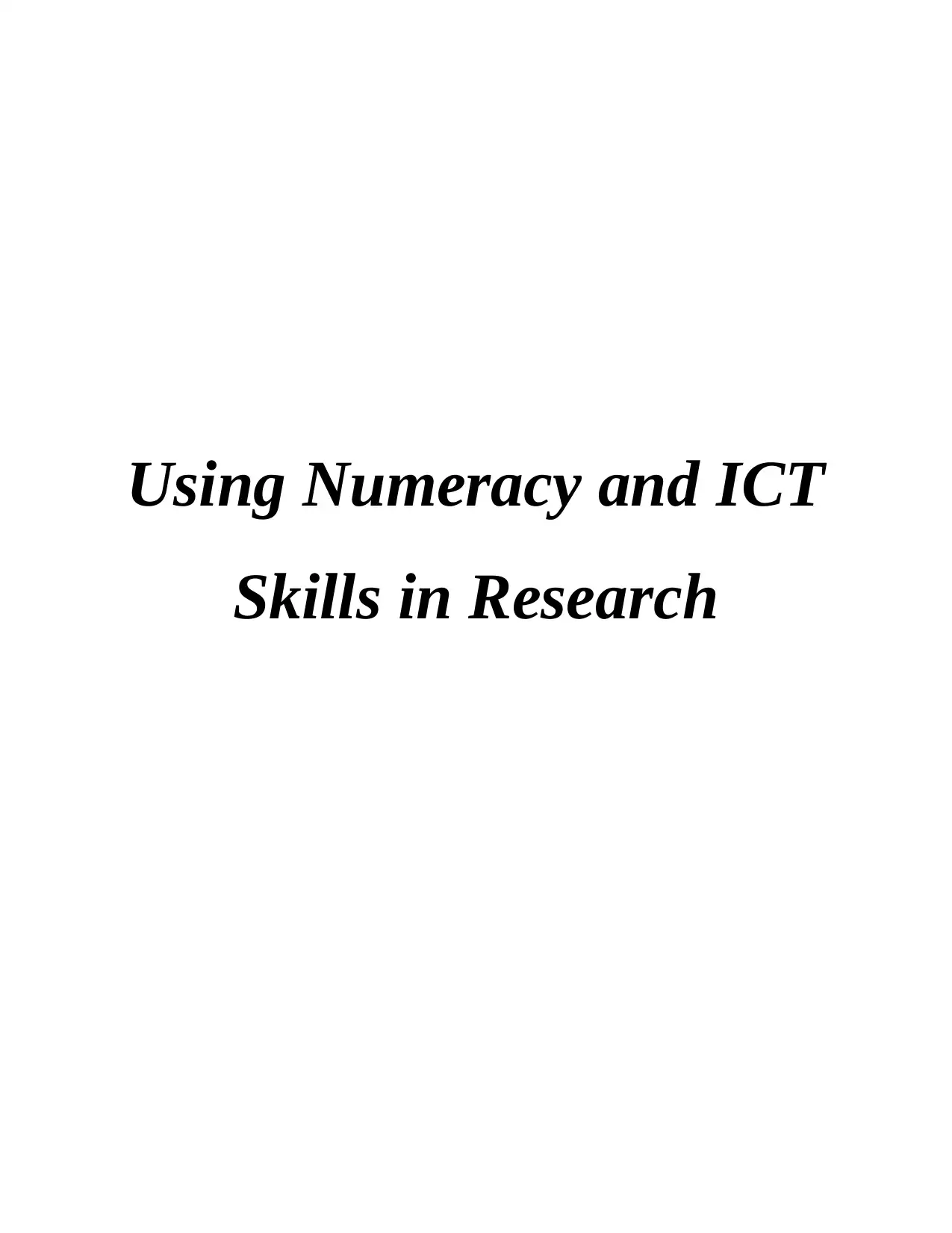
Using Numeracy and ICT
Skills in Research
Skills in Research
Paraphrase This Document
Need a fresh take? Get an instant paraphrase of this document with our AI Paraphraser
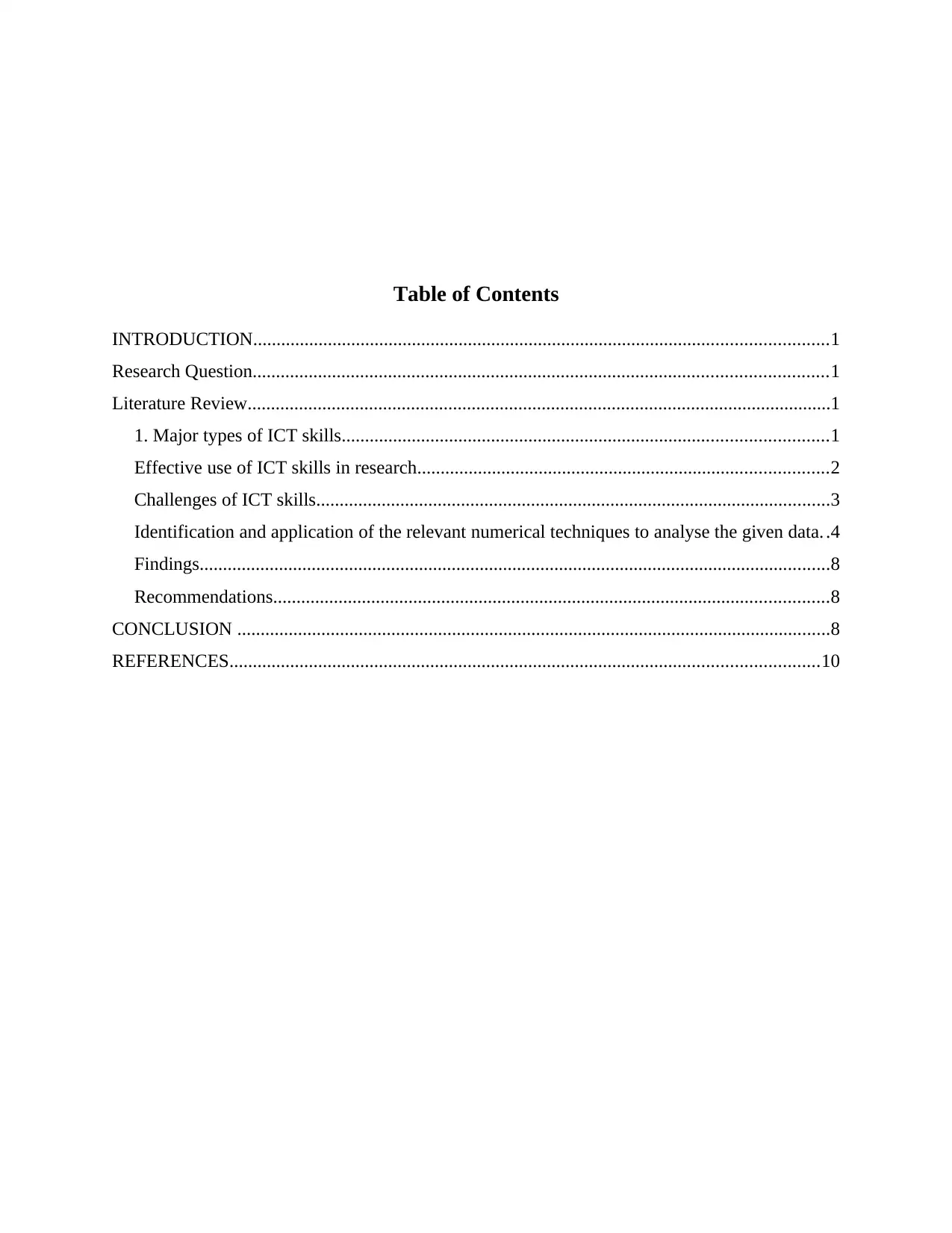
Table of Contents
INTRODUCTION...........................................................................................................................1
Research Question...........................................................................................................................1
Literature Review.............................................................................................................................1
1. Major types of ICT skills........................................................................................................1
Effective use of ICT skills in research........................................................................................2
Challenges of ICT skills..............................................................................................................3
Identification and application of the relevant numerical techniques to analyse the given data. .4
Findings.......................................................................................................................................8
Recommendations.......................................................................................................................8
CONCLUSION ...............................................................................................................................8
REFERENCES..............................................................................................................................10
INTRODUCTION...........................................................................................................................1
Research Question...........................................................................................................................1
Literature Review.............................................................................................................................1
1. Major types of ICT skills........................................................................................................1
Effective use of ICT skills in research........................................................................................2
Challenges of ICT skills..............................................................................................................3
Identification and application of the relevant numerical techniques to analyse the given data. .4
Findings.......................................................................................................................................8
Recommendations.......................................................................................................................8
CONCLUSION ...............................................................................................................................8
REFERENCES..............................................................................................................................10
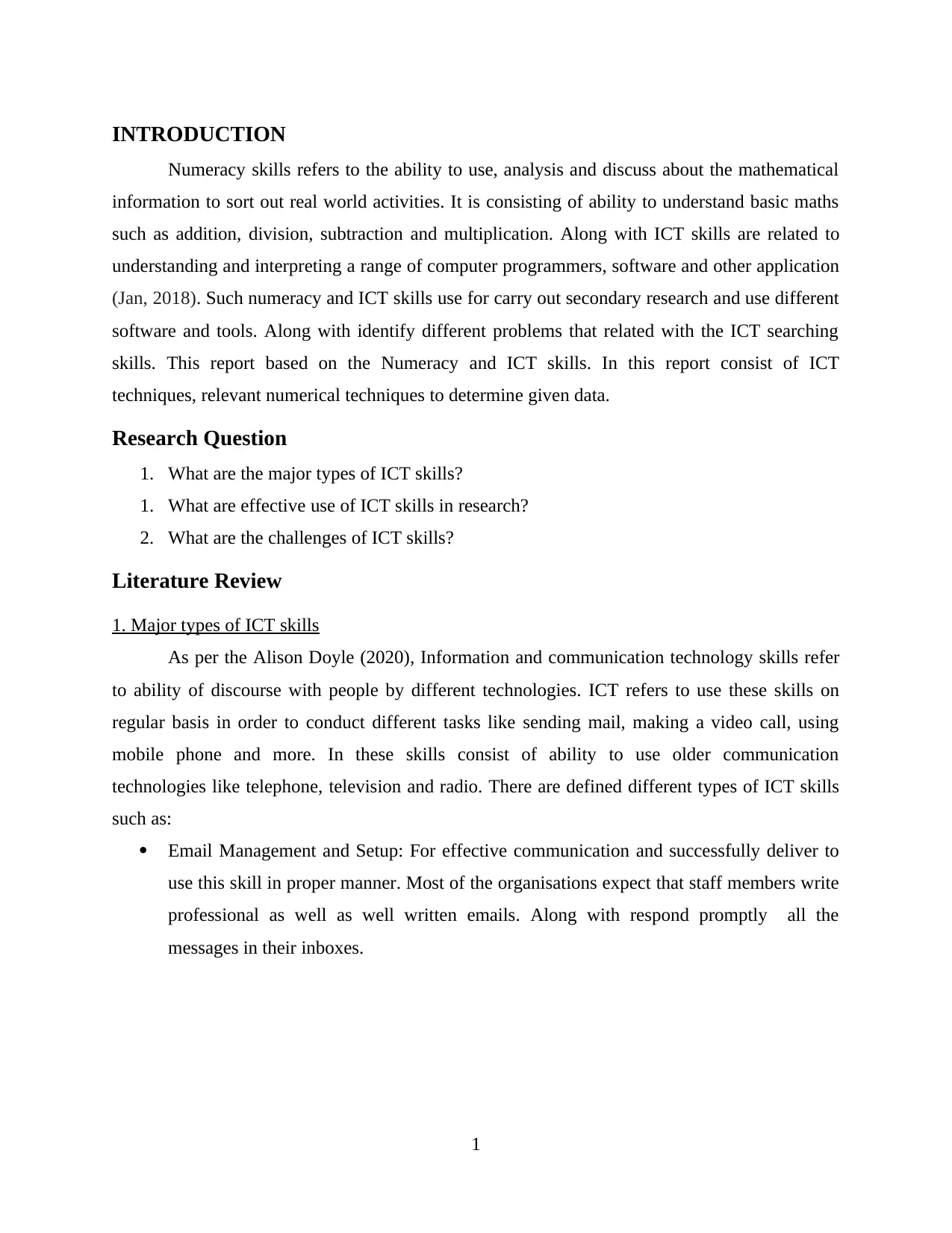
INTRODUCTION
Numeracy skills refers to the ability to use, analysis and discuss about the mathematical
information to sort out real world activities. It is consisting of ability to understand basic maths
such as addition, division, subtraction and multiplication. Along with ICT skills are related to
understanding and interpreting a range of computer programmers, software and other application
(Jan, 2018). Such numeracy and ICT skills use for carry out secondary research and use different
software and tools. Along with identify different problems that related with the ICT searching
skills. This report based on the Numeracy and ICT skills. In this report consist of ICT
techniques, relevant numerical techniques to determine given data.
Research Question
1. What are the major types of ICT skills?
1. What are effective use of ICT skills in research?
2. What are the challenges of ICT skills?
Literature Review
1. Major types of ICT skills
As per the Alison Doyle (2020), Information and communication technology skills refer
to ability of discourse with people by different technologies. ICT refers to use these skills on
regular basis in order to conduct different tasks like sending mail, making a video call, using
mobile phone and more. In these skills consist of ability to use older communication
technologies like telephone, television and radio. There are defined different types of ICT skills
such as:
Email Management and Setup: For effective communication and successfully deliver to
use this skill in proper manner. Most of the organisations expect that staff members write
professional as well as well written emails. Along with respond promptly all the
messages in their inboxes.
1
Numeracy skills refers to the ability to use, analysis and discuss about the mathematical
information to sort out real world activities. It is consisting of ability to understand basic maths
such as addition, division, subtraction and multiplication. Along with ICT skills are related to
understanding and interpreting a range of computer programmers, software and other application
(Jan, 2018). Such numeracy and ICT skills use for carry out secondary research and use different
software and tools. Along with identify different problems that related with the ICT searching
skills. This report based on the Numeracy and ICT skills. In this report consist of ICT
techniques, relevant numerical techniques to determine given data.
Research Question
1. What are the major types of ICT skills?
1. What are effective use of ICT skills in research?
2. What are the challenges of ICT skills?
Literature Review
1. Major types of ICT skills
As per the Alison Doyle (2020), Information and communication technology skills refer
to ability of discourse with people by different technologies. ICT refers to use these skills on
regular basis in order to conduct different tasks like sending mail, making a video call, using
mobile phone and more. In these skills consist of ability to use older communication
technologies like telephone, television and radio. There are defined different types of ICT skills
such as:
Email Management and Setup: For effective communication and successfully deliver to
use this skill in proper manner. Most of the organisations expect that staff members write
professional as well as well written emails. Along with respond promptly all the
messages in their inboxes.
1
⊘ This is a preview!⊘
Do you want full access?
Subscribe today to unlock all pages.

Trusted by 1+ million students worldwide
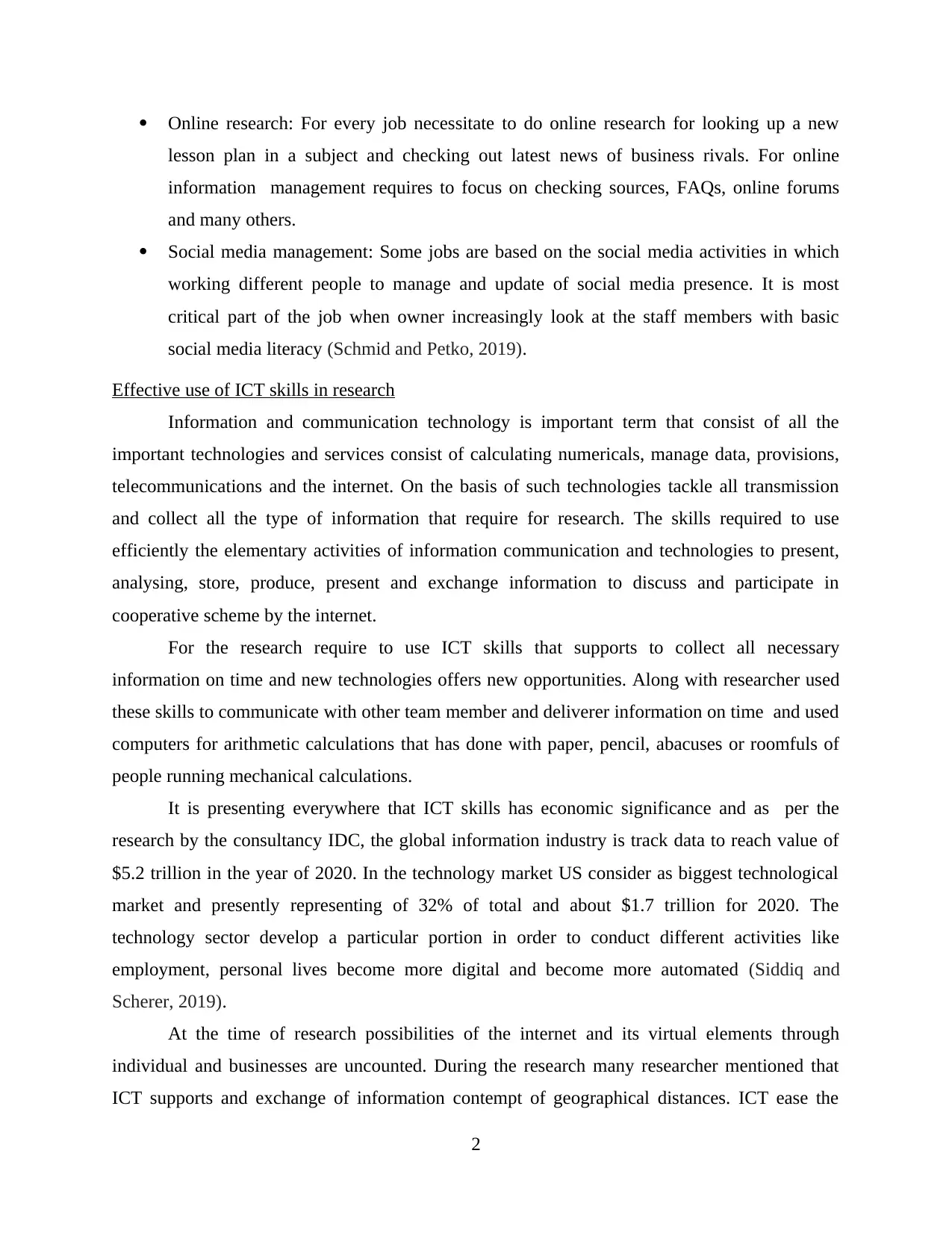
Online research: For every job necessitate to do online research for looking up a new
lesson plan in a subject and checking out latest news of business rivals. For online
information management requires to focus on checking sources, FAQs, online forums
and many others.
Social media management: Some jobs are based on the social media activities in which
working different people to manage and update of social media presence. It is most
critical part of the job when owner increasingly look at the staff members with basic
social media literacy (Schmid and Petko, 2019).
Effective use of ICT skills in research
Information and communication technology is important term that consist of all the
important technologies and services consist of calculating numericals, manage data, provisions,
telecommunications and the internet. On the basis of such technologies tackle all transmission
and collect all the type of information that require for research. The skills required to use
efficiently the elementary activities of information communication and technologies to present,
analysing, store, produce, present and exchange information to discuss and participate in
cooperative scheme by the internet.
For the research require to use ICT skills that supports to collect all necessary
information on time and new technologies offers new opportunities. Along with researcher used
these skills to communicate with other team member and deliverer information on time and used
computers for arithmetic calculations that has done with paper, pencil, abacuses or roomfuls of
people running mechanical calculations.
It is presenting everywhere that ICT skills has economic significance and as per the
research by the consultancy IDC, the global information industry is track data to reach value of
$5.2 trillion in the year of 2020. In the technology market US consider as biggest technological
market and presently representing of 32% of total and about $1.7 trillion for 2020. The
technology sector develop a particular portion in order to conduct different activities like
employment, personal lives become more digital and become more automated (Siddiq and
Scherer, 2019).
At the time of research possibilities of the internet and its virtual elements through
individual and businesses are uncounted. During the research many researcher mentioned that
ICT supports and exchange of information contempt of geographical distances. ICT ease the
2
lesson plan in a subject and checking out latest news of business rivals. For online
information management requires to focus on checking sources, FAQs, online forums
and many others.
Social media management: Some jobs are based on the social media activities in which
working different people to manage and update of social media presence. It is most
critical part of the job when owner increasingly look at the staff members with basic
social media literacy (Schmid and Petko, 2019).
Effective use of ICT skills in research
Information and communication technology is important term that consist of all the
important technologies and services consist of calculating numericals, manage data, provisions,
telecommunications and the internet. On the basis of such technologies tackle all transmission
and collect all the type of information that require for research. The skills required to use
efficiently the elementary activities of information communication and technologies to present,
analysing, store, produce, present and exchange information to discuss and participate in
cooperative scheme by the internet.
For the research require to use ICT skills that supports to collect all necessary
information on time and new technologies offers new opportunities. Along with researcher used
these skills to communicate with other team member and deliverer information on time and used
computers for arithmetic calculations that has done with paper, pencil, abacuses or roomfuls of
people running mechanical calculations.
It is presenting everywhere that ICT skills has economic significance and as per the
research by the consultancy IDC, the global information industry is track data to reach value of
$5.2 trillion in the year of 2020. In the technology market US consider as biggest technological
market and presently representing of 32% of total and about $1.7 trillion for 2020. The
technology sector develop a particular portion in order to conduct different activities like
employment, personal lives become more digital and become more automated (Siddiq and
Scherer, 2019).
At the time of research possibilities of the internet and its virtual elements through
individual and businesses are uncounted. During the research many researcher mentioned that
ICT supports and exchange of information contempt of geographical distances. ICT ease the
2
Paraphrase This Document
Need a fresh take? Get an instant paraphrase of this document with our AI Paraphraser
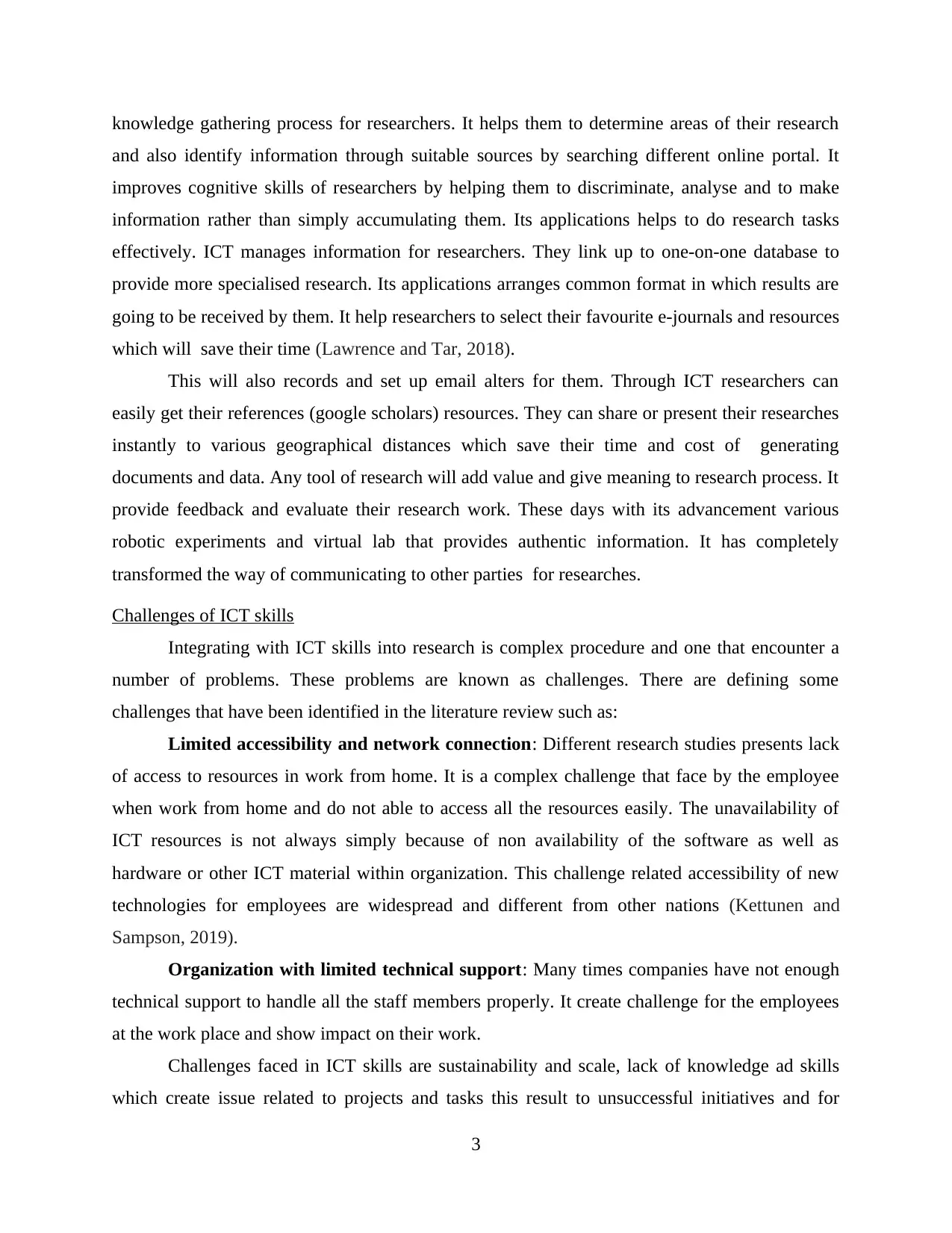
knowledge gathering process for researchers. It helps them to determine areas of their research
and also identify information through suitable sources by searching different online portal. It
improves cognitive skills of researchers by helping them to discriminate, analyse and to make
information rather than simply accumulating them. Its applications helps to do research tasks
effectively. ICT manages information for researchers. They link up to one-on-one database to
provide more specialised research. Its applications arranges common format in which results are
going to be received by them. It help researchers to select their favourite e-journals and resources
which will save their time (Lawrence and Tar, 2018).
This will also records and set up email alters for them. Through ICT researchers can
easily get their references (google scholars) resources. They can share or present their researches
instantly to various geographical distances which save their time and cost of generating
documents and data. Any tool of research will add value and give meaning to research process. It
provide feedback and evaluate their research work. These days with its advancement various
robotic experiments and virtual lab that provides authentic information. It has completely
transformed the way of communicating to other parties for researches.
Challenges of ICT skills
Integrating with ICT skills into research is complex procedure and one that encounter a
number of problems. These problems are known as challenges. There are defining some
challenges that have been identified in the literature review such as:
Limited accessibility and network connection: Different research studies presents lack
of access to resources in work from home. It is a complex challenge that face by the employee
when work from home and do not able to access all the resources easily. The unavailability of
ICT resources is not always simply because of non availability of the software as well as
hardware or other ICT material within organization. This challenge related accessibility of new
technologies for employees are widespread and different from other nations (Kettunen and
Sampson, 2019).
Organization with limited technical support: Many times companies have not enough
technical support to handle all the staff members properly. It create challenge for the employees
at the work place and show impact on their work.
Challenges faced in ICT skills are sustainability and scale, lack of knowledge ad skills
which create issue related to projects and tasks this result to unsuccessful initiatives and for
3
and also identify information through suitable sources by searching different online portal. It
improves cognitive skills of researchers by helping them to discriminate, analyse and to make
information rather than simply accumulating them. Its applications helps to do research tasks
effectively. ICT manages information for researchers. They link up to one-on-one database to
provide more specialised research. Its applications arranges common format in which results are
going to be received by them. It help researchers to select their favourite e-journals and resources
which will save their time (Lawrence and Tar, 2018).
This will also records and set up email alters for them. Through ICT researchers can
easily get their references (google scholars) resources. They can share or present their researches
instantly to various geographical distances which save their time and cost of generating
documents and data. Any tool of research will add value and give meaning to research process. It
provide feedback and evaluate their research work. These days with its advancement various
robotic experiments and virtual lab that provides authentic information. It has completely
transformed the way of communicating to other parties for researches.
Challenges of ICT skills
Integrating with ICT skills into research is complex procedure and one that encounter a
number of problems. These problems are known as challenges. There are defining some
challenges that have been identified in the literature review such as:
Limited accessibility and network connection: Different research studies presents lack
of access to resources in work from home. It is a complex challenge that face by the employee
when work from home and do not able to access all the resources easily. The unavailability of
ICT resources is not always simply because of non availability of the software as well as
hardware or other ICT material within organization. This challenge related accessibility of new
technologies for employees are widespread and different from other nations (Kettunen and
Sampson, 2019).
Organization with limited technical support: Many times companies have not enough
technical support to handle all the staff members properly. It create challenge for the employees
at the work place and show impact on their work.
Challenges faced in ICT skills are sustainability and scale, lack of knowledge ad skills
which create issue related to projects and tasks this result to unsuccessful initiatives and for
3
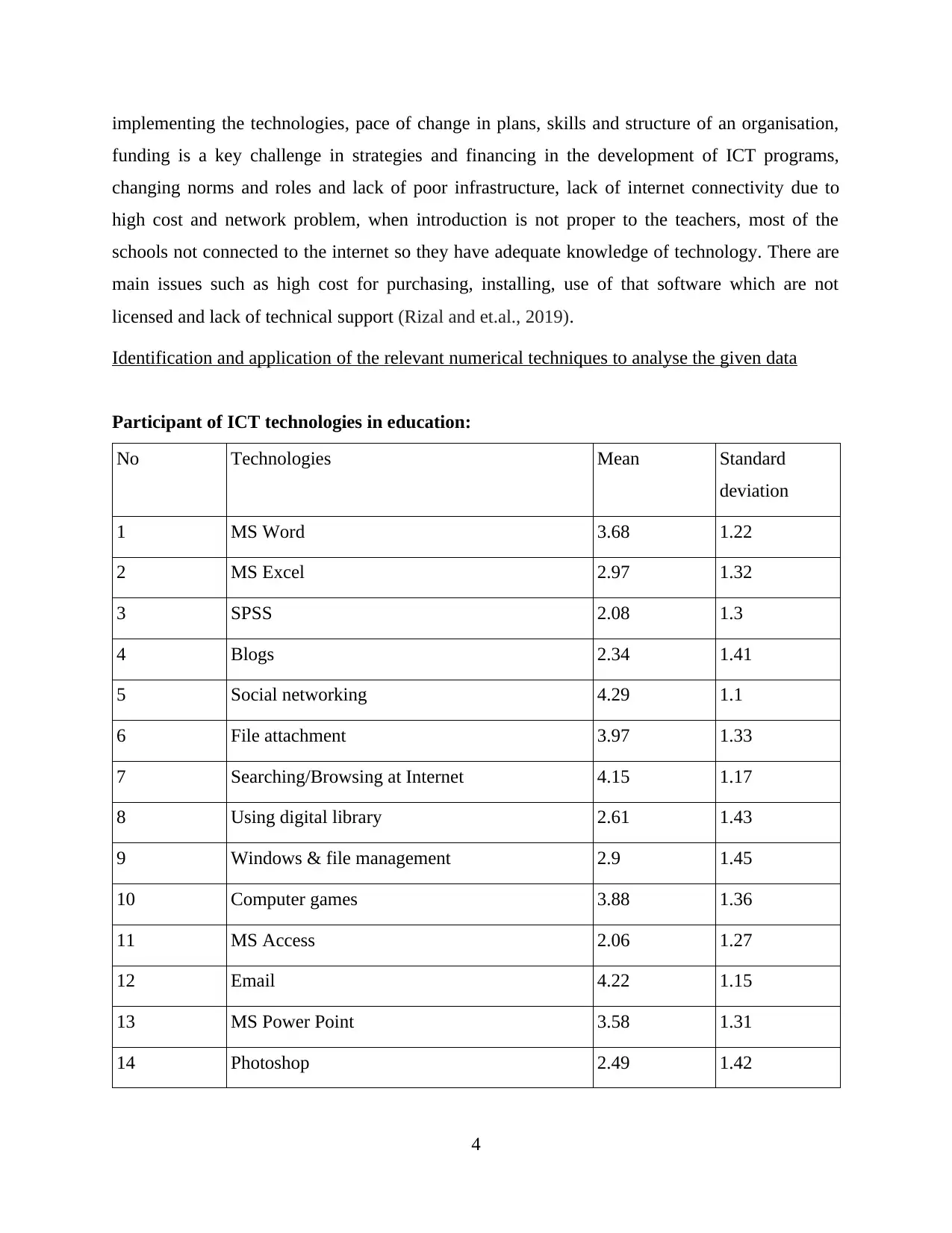
implementing the technologies, pace of change in plans, skills and structure of an organisation,
funding is a key challenge in strategies and financing in the development of ICT programs,
changing norms and roles and lack of poor infrastructure, lack of internet connectivity due to
high cost and network problem, when introduction is not proper to the teachers, most of the
schools not connected to the internet so they have adequate knowledge of technology. There are
main issues such as high cost for purchasing, installing, use of that software which are not
licensed and lack of technical support (Rizal and et.al., 2019).
Identification and application of the relevant numerical techniques to analyse the given data
Participant of ICT technologies in education:
No Technologies Mean Standard
deviation
1 MS Word 3.68 1.22
2 MS Excel 2.97 1.32
3 SPSS 2.08 1.3
4 Blogs 2.34 1.41
5 Social networking 4.29 1.1
6 File attachment 3.97 1.33
7 Searching/Browsing at Internet 4.15 1.17
8 Using digital library 2.61 1.43
9 Windows & file management 2.9 1.45
10 Computer games 3.88 1.36
11 MS Access 2.06 1.27
12 Email 4.22 1.15
13 MS Power Point 3.58 1.31
14 Photoshop 2.49 1.42
4
funding is a key challenge in strategies and financing in the development of ICT programs,
changing norms and roles and lack of poor infrastructure, lack of internet connectivity due to
high cost and network problem, when introduction is not proper to the teachers, most of the
schools not connected to the internet so they have adequate knowledge of technology. There are
main issues such as high cost for purchasing, installing, use of that software which are not
licensed and lack of technical support (Rizal and et.al., 2019).
Identification and application of the relevant numerical techniques to analyse the given data
Participant of ICT technologies in education:
No Technologies Mean Standard
deviation
1 MS Word 3.68 1.22
2 MS Excel 2.97 1.32
3 SPSS 2.08 1.3
4 Blogs 2.34 1.41
5 Social networking 4.29 1.1
6 File attachment 3.97 1.33
7 Searching/Browsing at Internet 4.15 1.17
8 Using digital library 2.61 1.43
9 Windows & file management 2.9 1.45
10 Computer games 3.88 1.36
11 MS Access 2.06 1.27
12 Email 4.22 1.15
13 MS Power Point 3.58 1.31
14 Photoshop 2.49 1.42
4
⊘ This is a preview!⊘
Do you want full access?
Subscribe today to unlock all pages.

Trusted by 1+ million students worldwide
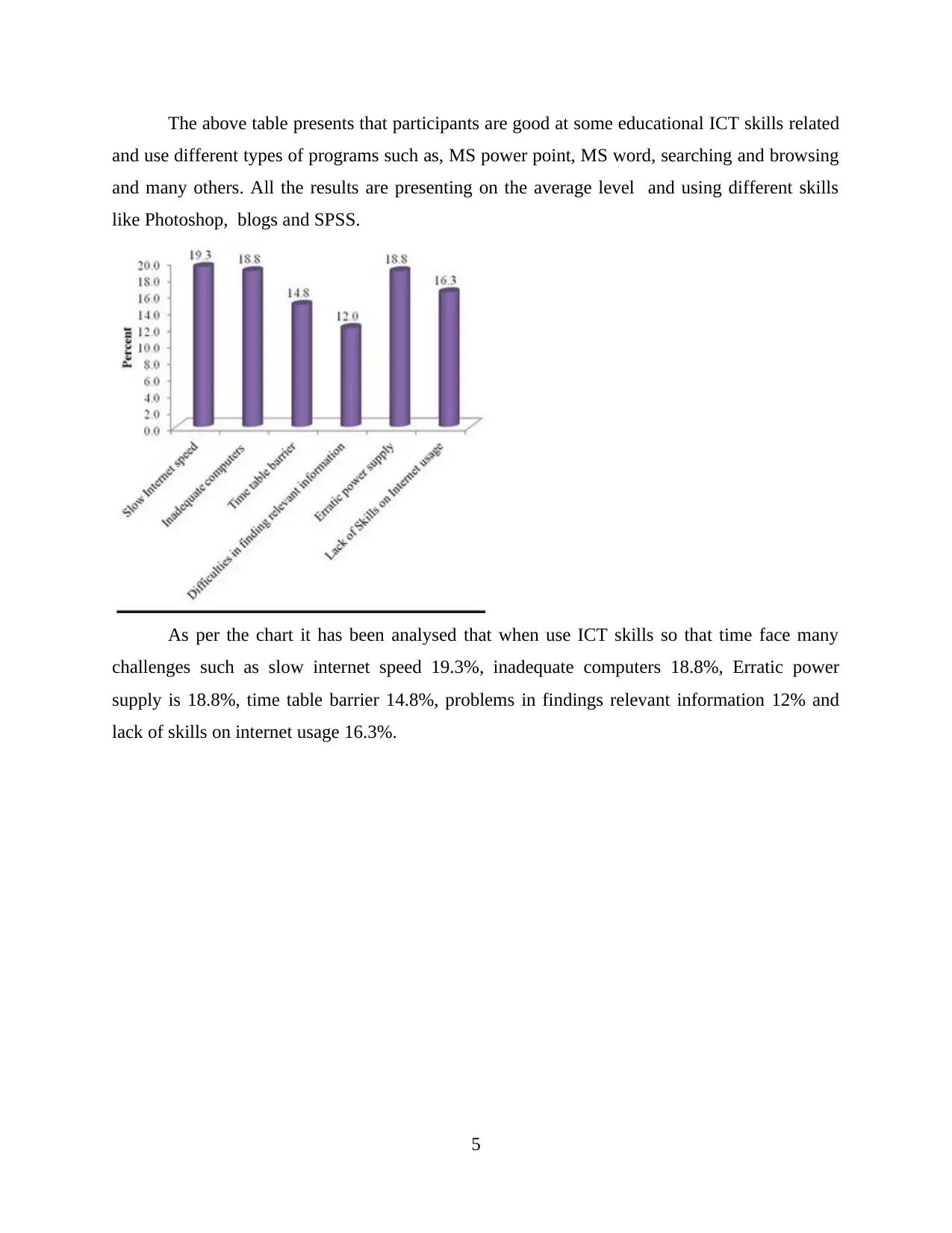
The above table presents that participants are good at some educational ICT skills related
and use different types of programs such as, MS power point, MS word, searching and browsing
and many others. All the results are presenting on the average level and using different skills
like Photoshop, blogs and SPSS.
As per the chart it has been analysed that when use ICT skills so that time face many
challenges such as slow internet speed 19.3%, inadequate computers 18.8%, Erratic power
supply is 18.8%, time table barrier 14.8%, problems in findings relevant information 12% and
lack of skills on internet usage 16.3%.
5
and use different types of programs such as, MS power point, MS word, searching and browsing
and many others. All the results are presenting on the average level and using different skills
like Photoshop, blogs and SPSS.
As per the chart it has been analysed that when use ICT skills so that time face many
challenges such as slow internet speed 19.3%, inadequate computers 18.8%, Erratic power
supply is 18.8%, time table barrier 14.8%, problems in findings relevant information 12% and
lack of skills on internet usage 16.3%.
5
Paraphrase This Document
Need a fresh take? Get an instant paraphrase of this document with our AI Paraphraser
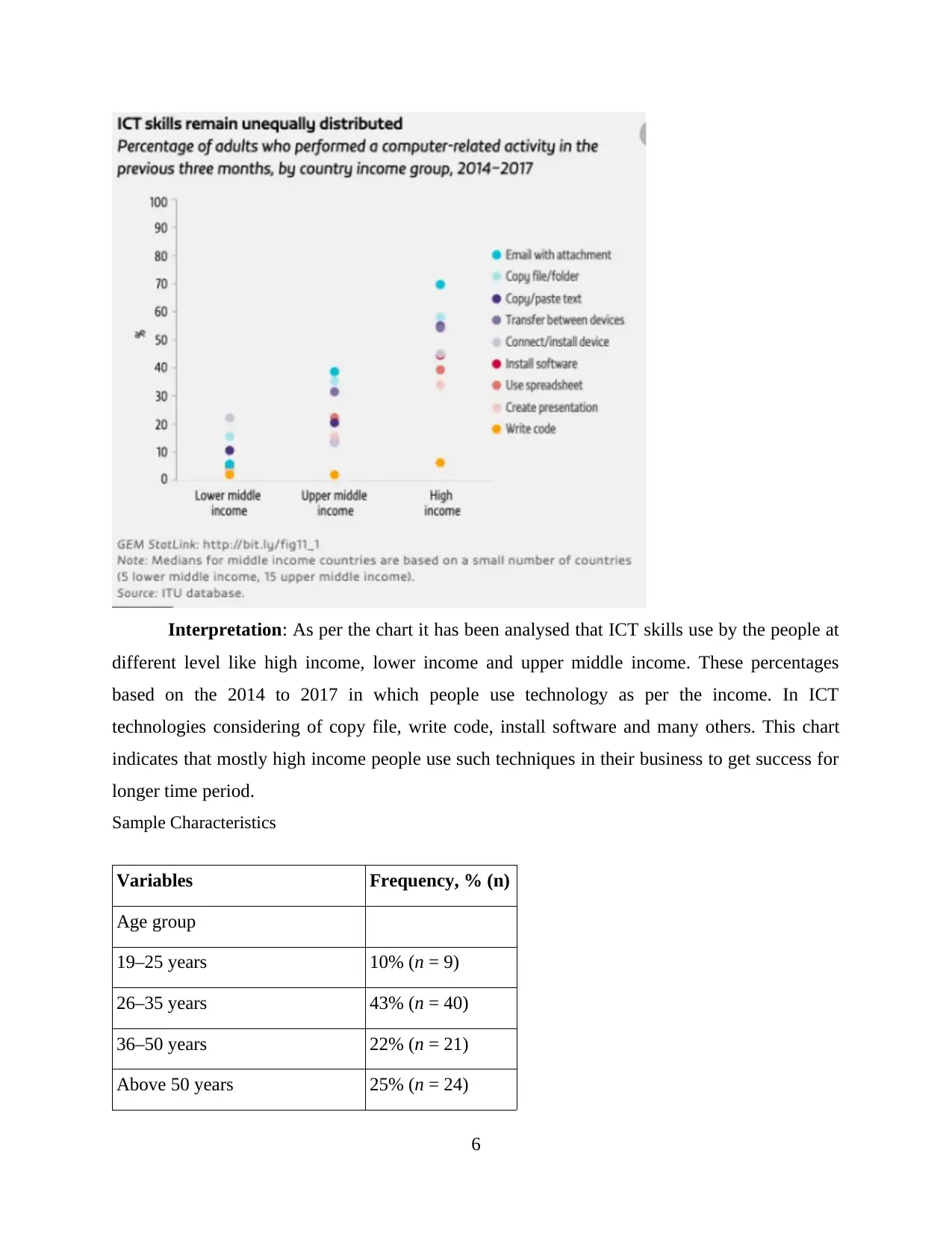
Interpretation: As per the chart it has been analysed that ICT skills use by the people at
different level like high income, lower income and upper middle income. These percentages
based on the 2014 to 2017 in which people use technology as per the income. In ICT
technologies considering of copy file, write code, install software and many others. This chart
indicates that mostly high income people use such techniques in their business to get success for
longer time period.
Sample Characteristics
Variables Frequency, % (n)
Age group
19–25 years 10% (n = 9)
26–35 years 43% (n = 40)
36–50 years 22% (n = 21)
Above 50 years 25% (n = 24)
6
different level like high income, lower income and upper middle income. These percentages
based on the 2014 to 2017 in which people use technology as per the income. In ICT
technologies considering of copy file, write code, install software and many others. This chart
indicates that mostly high income people use such techniques in their business to get success for
longer time period.
Sample Characteristics
Variables Frequency, % (n)
Age group
19–25 years 10% (n = 9)
26–35 years 43% (n = 40)
36–50 years 22% (n = 21)
Above 50 years 25% (n = 24)
6
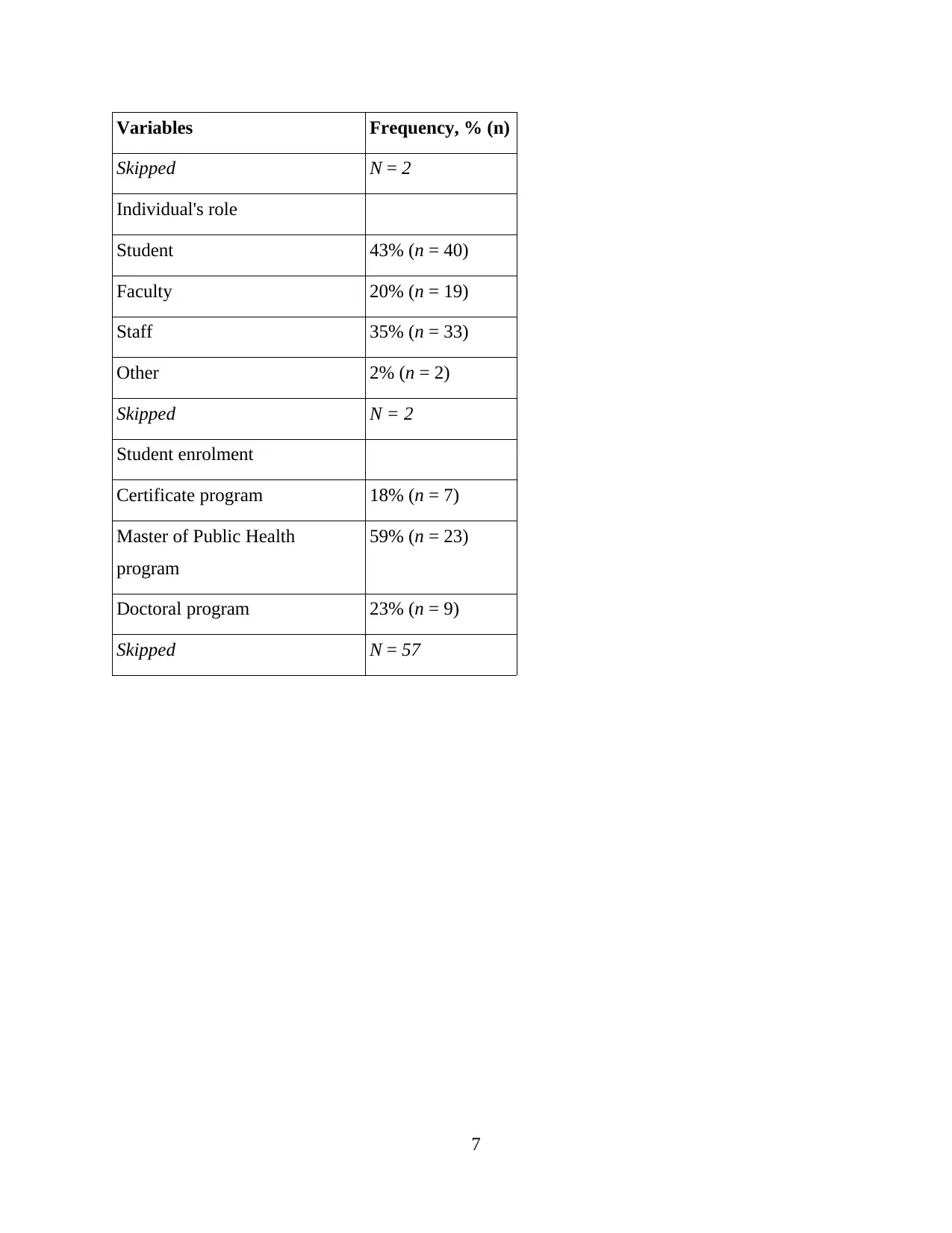
Variables Frequency, % (n)
Skipped N = 2
Individual's role
Student 43% (n = 40)
Faculty 20% (n = 19)
Staff 35% (n = 33)
Other 2% (n = 2)
Skipped N = 2
Student enrolment
Certificate program 18% (n = 7)
Master of Public Health
program
59% (n = 23)
Doctoral program 23% (n = 9)
Skipped N = 57
7
Skipped N = 2
Individual's role
Student 43% (n = 40)
Faculty 20% (n = 19)
Staff 35% (n = 33)
Other 2% (n = 2)
Skipped N = 2
Student enrolment
Certificate program 18% (n = 7)
Master of Public Health
program
59% (n = 23)
Doctoral program 23% (n = 9)
Skipped N = 57
7
⊘ This is a preview!⊘
Do you want full access?
Subscribe today to unlock all pages.

Trusted by 1+ million students worldwide
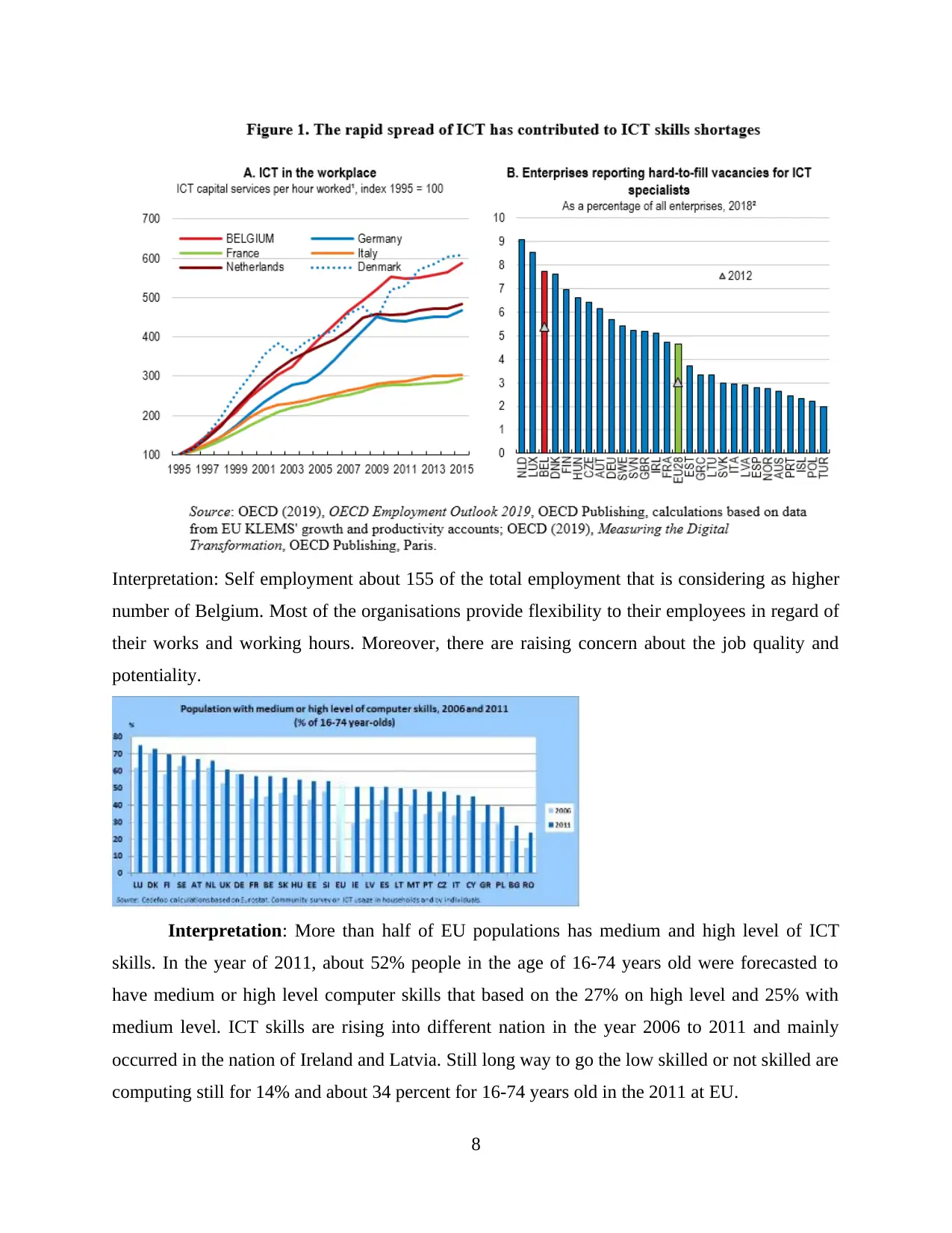
Interpretation: Self employment about 155 of the total employment that is considering as higher
number of Belgium. Most of the organisations provide flexibility to their employees in regard of
their works and working hours. Moreover, there are raising concern about the job quality and
potentiality.
Interpretation: More than half of EU populations has medium and high level of ICT
skills. In the year of 2011, about 52% people in the age of 16-74 years old were forecasted to
have medium or high level computer skills that based on the 27% on high level and 25% with
medium level. ICT skills are rising into different nation in the year 2006 to 2011 and mainly
occurred in the nation of Ireland and Latvia. Still long way to go the low skilled or not skilled are
computing still for 14% and about 34 percent for 16-74 years old in the 2011 at EU.
8
number of Belgium. Most of the organisations provide flexibility to their employees in regard of
their works and working hours. Moreover, there are raising concern about the job quality and
potentiality.
Interpretation: More than half of EU populations has medium and high level of ICT
skills. In the year of 2011, about 52% people in the age of 16-74 years old were forecasted to
have medium or high level computer skills that based on the 27% on high level and 25% with
medium level. ICT skills are rising into different nation in the year 2006 to 2011 and mainly
occurred in the nation of Ireland and Latvia. Still long way to go the low skilled or not skilled are
computing still for 14% and about 34 percent for 16-74 years old in the 2011 at EU.
8
Paraphrase This Document
Need a fresh take? Get an instant paraphrase of this document with our AI Paraphraser
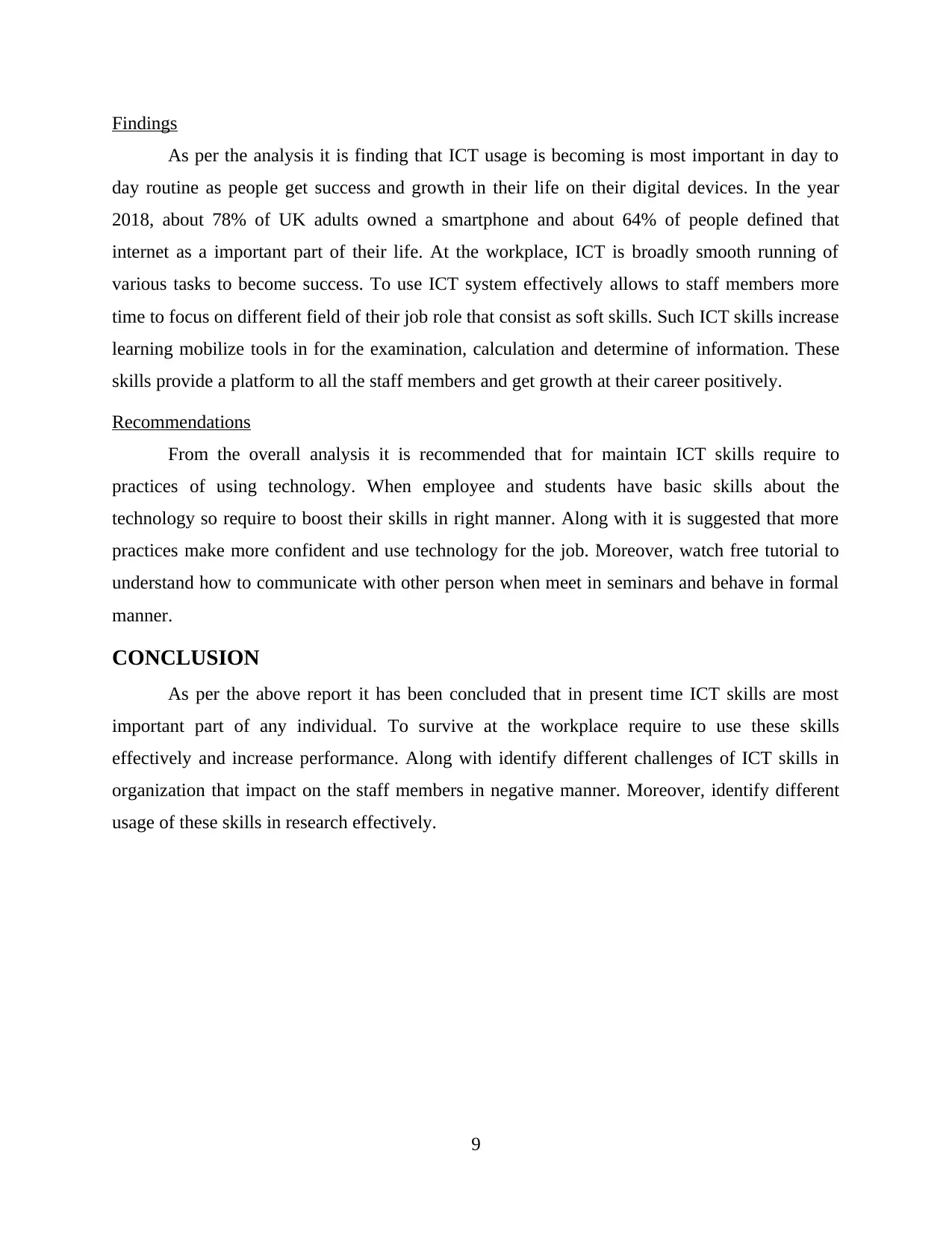
Findings
As per the analysis it is finding that ICT usage is becoming is most important in day to
day routine as people get success and growth in their life on their digital devices. In the year
2018, about 78% of UK adults owned a smartphone and about 64% of people defined that
internet as a important part of their life. At the workplace, ICT is broadly smooth running of
various tasks to become success. To use ICT system effectively allows to staff members more
time to focus on different field of their job role that consist as soft skills. Such ICT skills increase
learning mobilize tools in for the examination, calculation and determine of information. These
skills provide a platform to all the staff members and get growth at their career positively.
Recommendations
From the overall analysis it is recommended that for maintain ICT skills require to
practices of using technology. When employee and students have basic skills about the
technology so require to boost their skills in right manner. Along with it is suggested that more
practices make more confident and use technology for the job. Moreover, watch free tutorial to
understand how to communicate with other person when meet in seminars and behave in formal
manner.
CONCLUSION
As per the above report it has been concluded that in present time ICT skills are most
important part of any individual. To survive at the workplace require to use these skills
effectively and increase performance. Along with identify different challenges of ICT skills in
organization that impact on the staff members in negative manner. Moreover, identify different
usage of these skills in research effectively.
9
As per the analysis it is finding that ICT usage is becoming is most important in day to
day routine as people get success and growth in their life on their digital devices. In the year
2018, about 78% of UK adults owned a smartphone and about 64% of people defined that
internet as a important part of their life. At the workplace, ICT is broadly smooth running of
various tasks to become success. To use ICT system effectively allows to staff members more
time to focus on different field of their job role that consist as soft skills. Such ICT skills increase
learning mobilize tools in for the examination, calculation and determine of information. These
skills provide a platform to all the staff members and get growth at their career positively.
Recommendations
From the overall analysis it is recommended that for maintain ICT skills require to
practices of using technology. When employee and students have basic skills about the
technology so require to boost their skills in right manner. Along with it is suggested that more
practices make more confident and use technology for the job. Moreover, watch free tutorial to
understand how to communicate with other person when meet in seminars and behave in formal
manner.
CONCLUSION
As per the above report it has been concluded that in present time ICT skills are most
important part of any individual. To survive at the workplace require to use these skills
effectively and increase performance. Along with identify different challenges of ICT skills in
organization that impact on the staff members in negative manner. Moreover, identify different
usage of these skills in research effectively.
9

10
⊘ This is a preview!⊘
Do you want full access?
Subscribe today to unlock all pages.

Trusted by 1+ million students worldwide
1 out of 13
Related Documents
Your All-in-One AI-Powered Toolkit for Academic Success.
+13062052269
info@desklib.com
Available 24*7 on WhatsApp / Email
![[object Object]](/_next/static/media/star-bottom.7253800d.svg)
Unlock your academic potential
Copyright © 2020–2025 A2Z Services. All Rights Reserved. Developed and managed by ZUCOL.





